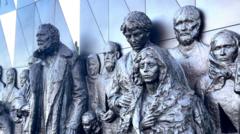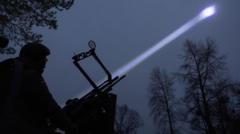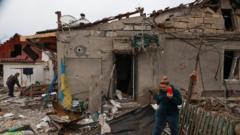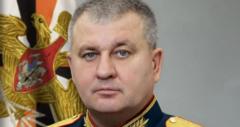In a notable shift, Russia's focus on World War II commemorations underscores a narrative of Soviet victimhood while sidelining the unique genocide of the Jewish people during the Holocaust.
Russia Centers Commemoration on Soviet Victims Ahead of Auschwitz Anniversary

Russia Centers Commemoration on Soviet Victims Ahead of Auschwitz Anniversary
As the 80th anniversary of Auschwitz looms, Russia emphasizes its narrative of Soviet suffering during WWII over broader Holocaust discussions.
On the outskirts of St. Petersburg, a towering memorial dedicated to "Soviet civilians who fell victim to the Nazi genocide" stands as a symbol of this evolving narrative. Bearing the figure of a grieving mother with her children and surrounded by an eternal flame, the memorial honors the millions of Soviet victims of World War II, an estimated 27 million civilians according to Russian accounts.
Last year, on January 27, Russian President Vladimir Putin unveiled the monument, marking a significant date for Russia as it commemorates both the 1944 lifting of the Leningrad siege and the Red Army's liberation of Auschwitz in 1945. However, this year, Putin was not invited to the annual ceremony in Poland honoring the Holocaust and the liberation of Auschwitz — a stark reflection of deteriorating relations between Russia and the West.
As the world prepares for the 80th anniversary of the Auschwitz liberation, the Russian narrative has emphasized the suffering of all Soviet citizens rather than the focused genocide of Jews in Nazi concentration camps. In a statement regarding the upcoming commemoration, Putin articulated the tragedy in the context of the "genocide of the Soviet people," neglecting to address the Holocaust's specific targeting of Jewish individuals.
Despite acknowledging the Holocaust in previous years, the current political climate has led to a noticeable shift in rhetoric. Israel's Ambassador to Moscow criticized this trend, underscoring the importance of recognizing the Holocaust as a systematic extermination of the Jewish race, distinct from the broader Soviet victimization narrative.
Historians and critics argue that the narrative change seeks to frame the Russian populace as victims, strategically distancing the country from historical accountability, especially amid ongoing conflict in Ukraine. This attempt to portray Russians as perpetual victims has garnered attention from historians and commentators who fear it diminishes the gravity of the Holocaust.
In Poland, the absence of Russian officials from the ceremony honoring the liberation of Auschwitz has reignited discussions about shared history and responsibility. Auschwitz Museum director Piotr Cywinski articulated that while they honor the victims, the current Russian narrative presents a challenge to recognizing the value of freedom.
Congruently, leaders within the Russian Jewish community have expressed discontent with the estrangement from the commemorative activities surrounding Auschwitz. Rabbi Alexander Boroda lamented the lack of invitation, emphasizing the importance of collaborative memory and shared values that enabled the defeat of fascism.
In response, Jewish organizations within Russia are striving to maintain awareness about the Holocaust and educate the public on this critical historical event, amid fears that rising nationalism and denialism could undermine the memory of past atrocities. Anna Bokshitskaya, executive director of the Russian Jewish Congress, highlighted the urgency of imparting this knowledge as global incidences of Holocaust denial increase.
As the world reflects on the harrowing legacy of Auschwitz and the Holocaust, Russia's commemorative path diverges, raising vital questions about the representation of history and the cultivation of collective memory.





















